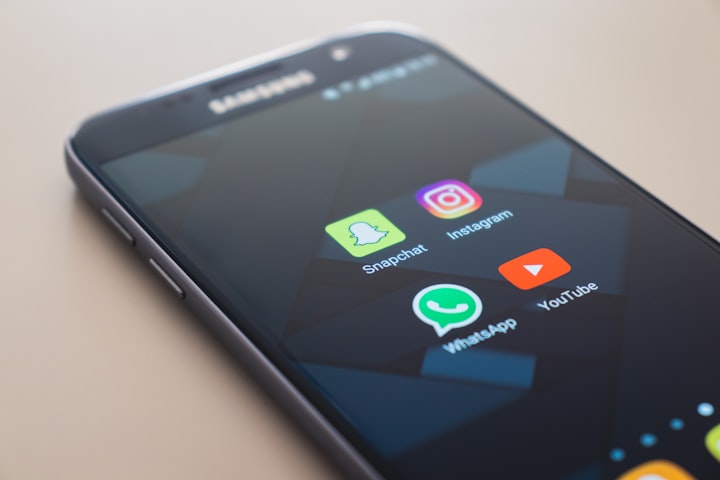Whatsapp is Wrecking Our Brains and No One Talks About It
It’s 2021, surely we should have seen this coming?

Whatsapp went down today (that's Monday 4th October if you're wondering). I saw loads of tweets about it. Half were frustration and anger, the other half were oddly celebratory as if people had finally been untethered from an evil technological mistress.
I can understand that, can you? How many WhatsApp groups do you have? I’ve got at least four that are active every day. I’m sure for you it’s the same or even more.
Another question: How many of those groups are full of memes, viral videos, and forwarded jokes?
I’m guessing all of them.
WhatsApp is a digital fly-tipping zone where people mindlessly forward unfunny, irrelevant, and uninspiring shit to dozens of people in one click. Mindless, knee-jerk forwarding, forever and ever.
If you don’t know what fly-tipping is (it might be British vernacular) it’s when people fill up a van with old mattresses, broken washing machines, cupboards, chairs, and general crap that they dump on the side of the road.
Go down many a winding country lane in Britain and someone will have stuck a load of their household waste on a grass verge. They don’t show you that in Bridget Jones’s Diary or The Holiday.
Fly-tipping is selfish, inconsiderate, and harmful. Just like the endless forwarded memes and videos on WhatsApp. It’s junk for the mind.
There’s a special type of soul-numbing that comes with opening Whatsapp to see a message saying “forwarded many times." It makes you feel dead inside. It’s empty calories, like a Big Mac, sent to your phone without thought or context, and shot into your eyes every time you open a group chat.
I wouldn’t care so much but there’s something much more sinister about all of this; it can kill.
When WhatsApp Kills
In 2018, a misleading and heavily edited video showing the fake kidnapping of a child swept through India via WhatsApp. It whipped up such hysteria a man wound up being falsely identified as the kidnapper and was beaten to death in the proceeding furore.
This was despite warnings by police the video was not real. This didn’t halt the escalation in violence; this was the tip of a brutal iceberg.
BBC News wrote a special feature on the Indian WhatsApp hysteria. They wrote:
“Since 2018, in India alone 31 people died in 23 incidents over two years. 20 of these violent mob attacks occurred between April and July 2018.”
Fake news is real, and its most pernicious effect is via WhatsApp. Unlike other social media, WhatsApp feels personal. The news comes from friends and lands in private chats.
But let’s back all this up a little.
It’s willingly ignorant to blame WhatsApp for either fake news or angry mobs. It is, after all, just a communication tool. Whatsapp owners Facebook (CEO Mark Zuckerberg bought the messaging service in February 2014 for a mere $16bn) realised how easily information travels between users on the platform, whether it be false stories, propaganda, or just an unfunny video you’ve seen a dozen times before.
To battle this, in 2018, Whatsapp began labelling messages as “forwards” and in some cases, “forwarded many times.”
Then in April 2020, they restricted the amount a message can be pushed on. They wrote:
“Messages that have been identified as highly forwarded — sent through a chain of five or more people — can only be forwarded to a single person.” Facebook says this has reduced the spread of viral Whatsapp messages by “70 percent.”
Still, it's not much of a restriction. These changes only mean people have to forward to one group at a time, rather than in bulk. And it still means relations with your best mates have been reduced down to never-ending memes and bullshit viral videos.
Fighting Back
I don’t want to seem dismissive of a real problem, but fake news is a known issue and Zuckerberg is trying to tackle it, no matter how ineffectively.
My problem — our collective enduring problem – with WhatsApp is it’s killing the art of conversation. It’s ruining friendships.
No one talks about this.
In the ’90s, comedian Bill Hicks said:
“Watching television is like taking black spray paint to your third eye.”
Goodness knows what he’d say about YouTube or WhatsApp. Perhaps these are more like spray-painting your actual eyes as well as blocking up your earholes. You don’t need them anymore anyway if the conversation has been boiled down to gifs and memes.
Here's how I've begun to fight back.
Two years ago, one of my WhatsApp groups came up with a rule of no forwarded videos, viral content or memes. Instead, we wanted just plain old conversation.
And do you know what? It’s utterly wonderful. An actual sanctuary from internet noise.
Juxtaposed to this sanctuary, in another group I'm in, I was forwarded a video of 4 people dropping dead when lightning hit a tree they were sheltering under.
I don't need to see that shit. It isn’t entertainment or news, it’s plain disrespectful voyeurism, the lowest of the low. I don’t want to see that, and yet it’s now how we communicate on WhatsApp. It's become normal.
Perhaps this is more how men communicate than women, perhaps it’s younger people rather than old (I find it hard to imagine your Grandma sharing a video of a deadly lightning strike) but until Zuckerberg and his band of merry nerds allow us individual control over what we can be sent, the only fight back is to agree with others not to forward viral crap.
It sounds old-fashioned — or at least, boring — but give it a try. You don’t miss what you don’t see and you get to reconnect with friends via real conversation.
Imagine! Wouldn't that be worth it?
I’m convinced people consume podcasts with such ravenous glee because they crave people actually talking.
Remember, the tech giants want you to use their platforms 24/7. Resistance is futile. Coming off WhatsApp in 2021 probably isn’t a workable solution.
What isn’t so futile is personal curation of your groups.
So make rules and set boundaries. Zuckerberg certainly won't do that for you.
WhatsApp doesn’t have to be the wild west of communication. Be the sheriff, run the bad guys out of town. It’s time WhatsApp became a law-abiding citizen.
About the Creator
Jamie Jackson
Between two skies and towards the night.






Comments
There are no comments for this story
Be the first to respond and start the conversation.